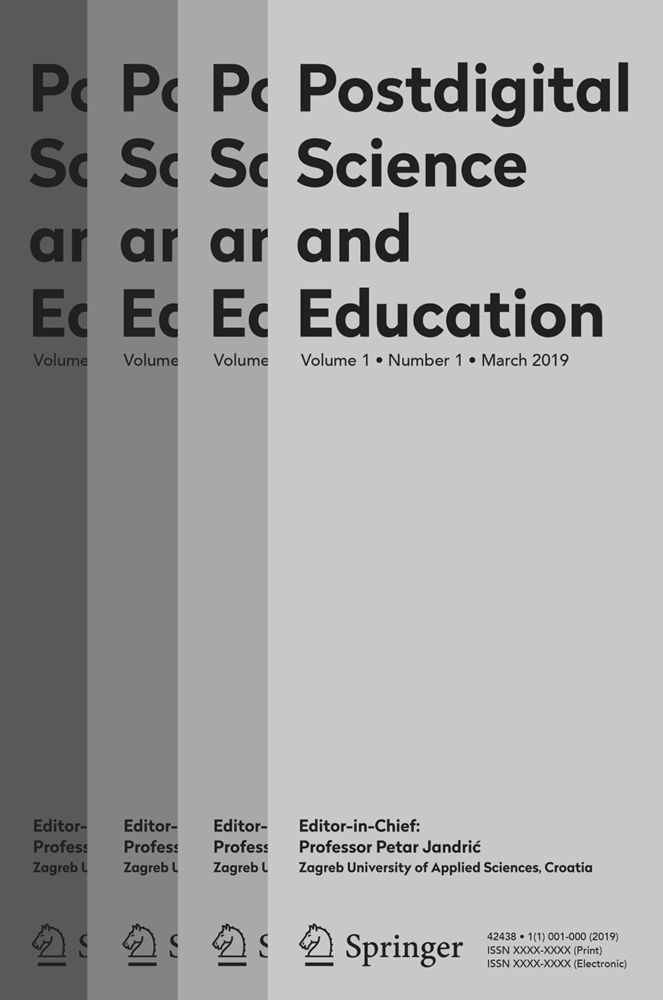
Ben Williamson
@benpatrickwill.bsky.social
Researching data, tech, futures, and biological sciences in education | Senior Lecturer and co-director at the Centre for Research in Digital Education | University of Edinburgh | Editor of Learning, Media and Technology @lmt-journal.bsky.social
The academic publishing industry is now open to AI - it's feeding academic IP to big AI firms and most of the deals are confidential so you'll never know if they're regurgitating your work and you will not be able to opt out except by not publishing at all. www.nature.com/articles/d41...

Publishers are selling papers to train AIs — and making millions of dollars
Generative-AI models require massive amounts of data — scholarly publishers are licensing their content to train them.
www.nature.com
November 9, 2025 at 1:09 AM
The academic publishing industry is now open to AI - it's feeding academic IP to big AI firms and most of the deals are confidential so you'll never know if they're regurgitating your work and you will not be able to opt out except by not publishing at all. www.nature.com/articles/d41...
The big new shift is handing over those research archives to the AI industry for model training. If Robert Maxwell was the media magnate who massified academic work in for-profit journals, then Sam Altman et al are AI empire builders raiding those archives to generate value from derivative products.
November 9, 2025 at 12:46 AM
The big new shift is handing over those research archives to the AI industry for model training. If Robert Maxwell was the media magnate who massified academic work in for-profit journals, then Sam Altman et al are AI empire builders raiding those archives to generate value from derivative products.
If the historiography is correct then academic publishing has been a massive industry for 70 years, driven by mega media empires. They constructed and own the knowledge infrastructures in which we built our scholarly archives. ...
November 9, 2025 at 12:39 AM
If the historiography is correct then academic publishing has been a massive industry for 70 years, driven by mega media empires. They constructed and own the knowledge infrastructures in which we built our scholarly archives. ...
Take your point, but as your original QP implied (as I interpreted it), there is something profoundly bereft about learning science measures of "learning" with "AI tutors". The evidence is both thin and ignores other ways of assessing AI in education - and you've reported on those problems of course
November 9, 2025 at 12:29 AM
Take your point, but as your original QP implied (as I interpreted it), there is something profoundly bereft about learning science measures of "learning" with "AI tutors". The evidence is both thin and ignores other ways of assessing AI in education - and you've reported on those problems of course
If we only assess AI in education via the gaze of the psy-sciences - as marginally statistically significant learning gains (or not) measured from constant live experiments on computers in classrooms - then we'll miss much else about what really matters about becoming educated.
November 8, 2025 at 11:47 PM
If we only assess AI in education via the gaze of the psy-sciences - as marginally statistically significant learning gains (or not) measured from constant live experiments on computers in classrooms - then we'll miss much else about what really matters about becoming educated.
What I worry about learning science as the lens for assessing AI in education is it reinforces the long history of the psy-sciences being mobilised to govern what happens in schools, via all its constructs, tests and metrics. It's the classroom-as-a-clinic model of school.
November 8, 2025 at 11:32 PM
What I worry about learning science as the lens for assessing AI in education is it reinforces the long history of the psy-sciences being mobilised to govern what happens in schools, via all its constructs, tests and metrics. It's the classroom-as-a-clinic model of school.
Ben Riley is right to call this out a bit - and the OP piece is to be fair really worth reading. But that piece also goes nowhere near a social understanding of AI in education. It's a cold learning scientific vision of metricized minds interacting with tech to increase measurable task performance.
November 8, 2025 at 11:22 PM
Ben Riley is right to call this out a bit - and the OP piece is to be fair really worth reading. But that piece also goes nowhere near a social understanding of AI in education. It's a cold learning scientific vision of metricized minds interacting with tech to increase measurable task performance.
Reposted by Ben Williamson
There is a difference between what school smartphone bans are supposed to do - resolve a moral panic - and what they actually do, which is to open up new market opportunities for vendors and budgetary headaches for schools.
November 8, 2025 at 9:49 AM
There is a difference between what school smartphone bans are supposed to do - resolve a moral panic - and what they actually do, which is to open up new market opportunities for vendors and budgetary headaches for schools.
"Learn to code" got into the English schools curriculum because of concerted efforts by tech industry and CompSci advocates - can't believe it's happening again. I documented this mirandanet.ac.uk/blog/2017/09...
Coding for what? Lessons from computing in the curriculum | MirandaNet
mirandanet.ac.uk
November 8, 2025 at 12:39 AM
"Learn to code" got into the English schools curriculum because of concerted efforts by tech industry and CompSci advocates - can't believe it's happening again. I documented this mirandanet.ac.uk/blog/2017/09...
Thanks Dave - and glad that sentence stood out. It took a little time and thought that I refuse to give up to AI.
November 8, 2025 at 12:12 AM
Thanks Dave - and glad that sentence stood out. It took a little time and thought that I refuse to give up to AI.
Check this out - it's possible bsky.app/profile/luke...
I so appreciate this attention to what we’ve been doing with ed tech at CUNY and the notion that the higher ed ecosystem can benefit from it. Too many folks to name have been involved in those projects over the years, and it builds upon work and commitments at CUNY that goes back generations.
Huge thanks to @mattseybold.bsky.social for writing this great post, which highlights CUNY's transformative potential to build open educational infrastructure
theamericanvandal.substack.com/p/mamdani-wi...
theamericanvandal.substack.com/p/mamdani-wi...
November 7, 2025 at 11:35 PM
Check this out - it's possible bsky.app/profile/luke...
We wrote about a few alternatives to this private re-infrastructuring of public education in the paper. These alternatives remain in the periphery but represent different pathways to better futures of education than the dismal narrative we're being told is inevitable right now. /end
November 7, 2025 at 9:57 PM
We wrote about a few alternatives to this private re-infrastructuring of public education in the paper. These alternatives remain in the periphery but represent different pathways to better futures of education than the dismal narrative we're being told is inevitable right now. /end
The result of what we call this re-infrastructuring of education by tech companies is likely to be increasing loss of control of pedagogic and administrative processes to automation and - our current big concern - "AI agents" that undermine the entire enterprise of education. 4/
November 7, 2025 at 9:48 PM
The result of what we call this re-infrastructuring of education by tech companies is likely to be increasing loss of control of pedagogic and administrative processes to automation and - our current big concern - "AI agents" that undermine the entire enterprise of education. 4/
Public education is locked-in to private big tech services that increasingly seem antithetical to public values of education yet at the same time underwrite practices of teaching and learning. 3/
November 7, 2025 at 9:38 PM
Public education is locked-in to private big tech services that increasingly seem antithetical to public values of education yet at the same time underwrite practices of teaching and learning. 3/
This private tech provision of platforms, cloud and AI services is what we meant in the paper by a "knowledge infrastructure crisis" in education. 2/
November 7, 2025 at 9:36 PM
This private tech provision of platforms, cloud and AI services is what we meant in the paper by a "knowledge infrastructure crisis" in education. 2/


